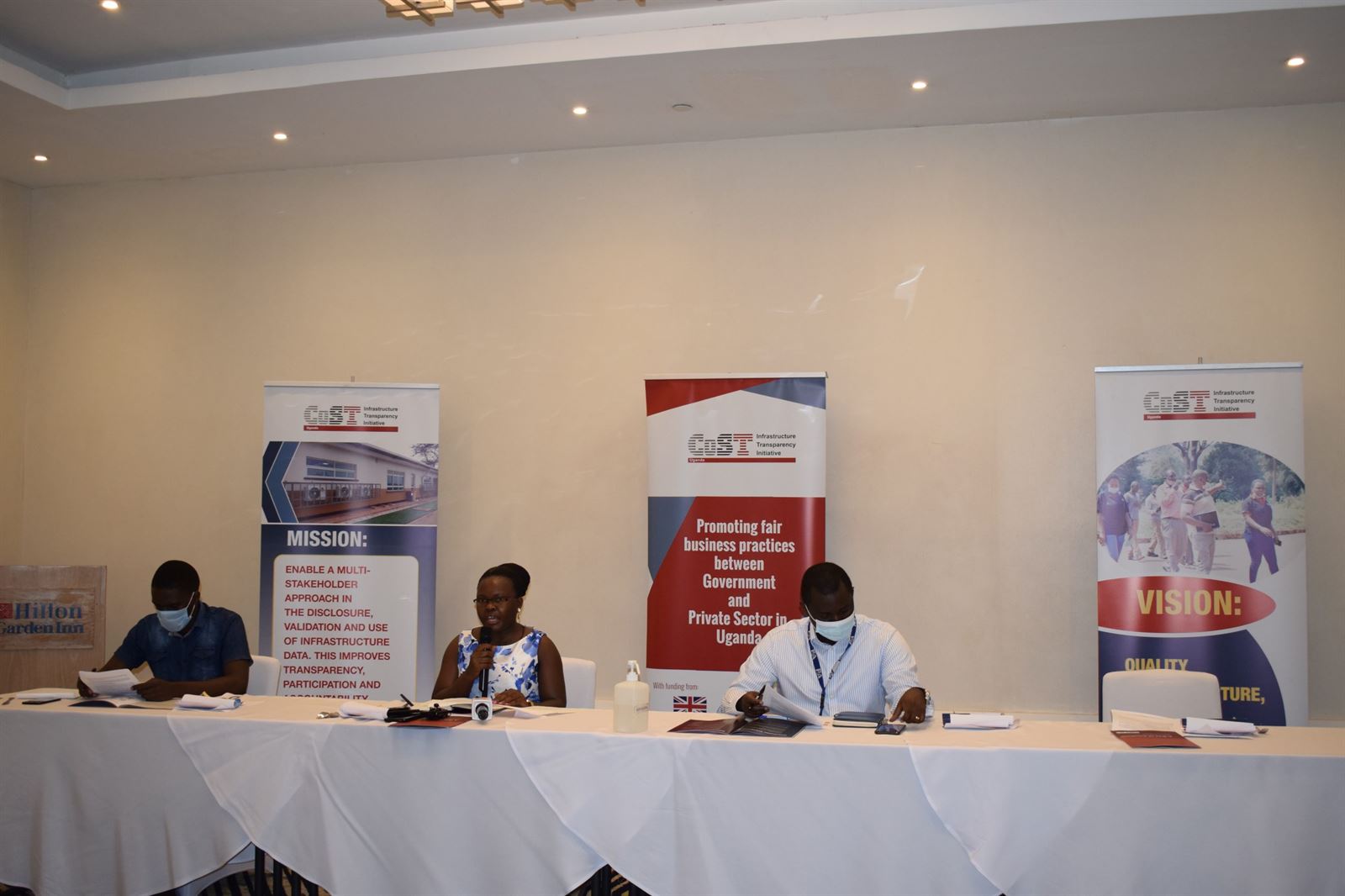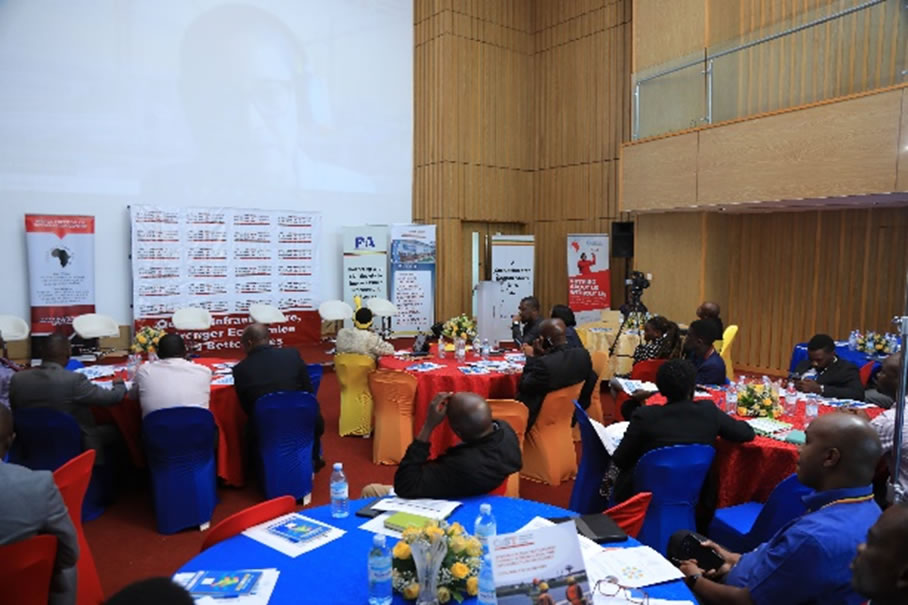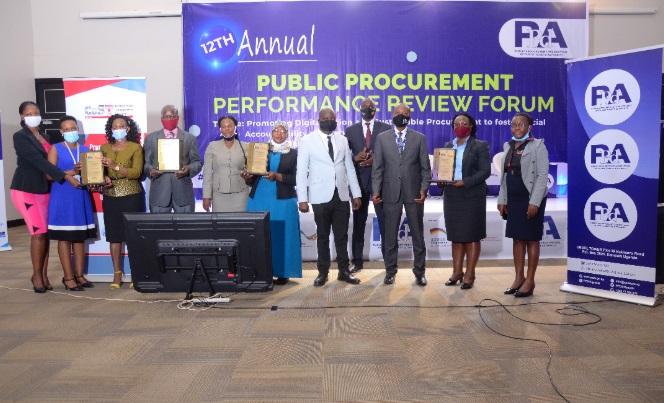
As the country grappled with managing the effects of COVID-19, there were unanswered questions relating to infrastructure transparency and accountability. At this critical moment, access to every information by citizens was key in the delivery of every service. The experience of the health sector where access to information on the prevention measures of the pandemic, in addition, the demand for better health and water sector infrastructure were a hot cake demonstrates the need to enhance the efficiency and performance of public infrastructure projects across the health, education, water and energy.
The construction industry was challenged in these times, especially as the pandemic occurred during the rainy season associated with floods that affected road and water transport as well as existing infrastructure such as hospitals, schools and construction sites. This coupled with floods and increased water levels of Lake Victoria escalated the situation. Lack of access to quality infrastructure affects access to key livelihood services like health which was critical during the period.
“As the lockdown continued, procurement of infrastructure projects and construction works continued, but the public was not aware of the projects being procured and constructed, this affected private sector participation and citizens monitoring of public projects. The “work from home” aspect made public officials more secretive in sharing information and this was exacerbated by the lack of equipment’s and poor internet connectivity to upload information” Olive Kabatwairwe, Programme Coordinator, CoST Uganda.
Limited disclosure – associated with dramatically increased demand for goods and services, limited compliance with value for money standards and political influence, influence peddling and corruption risks in procurement were candidates in the sector since Uganda lacked clear guidelines around emergency procurement, or acquisition of services during crisis situations. To promote transparency in the sector, CoST Uganda issued a statement[1] and conducted media engagements calling on the Government to put in place measures to ensure there is transparency and accountability in infrastructure investments during this or any future pandemic. This can be done by putting in place measures to ensure procurement is done in accordance with the law, and where possible, policy provisions such as guidelines should be put in place to ensure compliance and performance. This call was further strengthened by other stakeholders in various sectors.
Government has been responsive to stakeholder concerns, the call for transparency as well. Following stakeholder calls to action on creating a level playing field for procurement in crisis situations, Government established a process to develop Emergency Procurement Guidelines. Ministry of Finance, Planning and Economic Development (MoFPED) and PPDA invited CoST Uganda to share ideas on what could constitute the guidelines. CoST Uganda submitted 20 concerns of which 7 were taken on in the guidelines. The Emergency Procurement Guidelines will contribute to transparency, fairness and openness by the PEs to the private sector in engaging in procurement during difficult times.
PPDA revises bidding documents to promote transparency; Since the setup of the Business Integrity Initiative, influencing reforms in infrastructure delivery processes has been one of the core objectives. Following the fair business practices learning and reflection[2] meeting conducted on 13th August 2020, stakeholders expressed concern that Local Governments had not been highly engaged in the Business Integrity Initiative and yet, took a large share of investments /budget in public infrastructure procurement. It was also noted that, while using the Direct Procurement method, local governments did not comply with procurement regulations and safety, social or environmental safeguards, and there was scarcity of providers within these entities. As such, the sector was exposed to monopoly from a few providers and became a zone for influence peddling and patronage, straining and or leading to poor delivery of infrastructure projects. Local Governments also had funding constraints where unused funds from previous quarters would be required to be sent back to the treasury. These issues were further affirmed in the policy awareness webinar[3] in September 2020 organized by CoST Uganda where the stakeholders raised concerns regarding the lack of fairness and transparency within Local Governments, and the inadequate capacity of Local Governments to attract and sustain credible firms. The private sector also recommended that, PPDA should standardize the bidding documents to favor all bidders at Local and Central Government levels. PPDA revised the standard bidding document as a guideline for procurement of works under the Open Bidding for Local Governments on 15th September 2020. In the guidelines, PPDA stresses that Government revised the standard bidding document for the procurement of works under the open bidding methods for the use by the Local Governments with immediate effect.
Rewarding most transparent entities in the Assurance process.[4] To enhance transparency, CoST Uganda through its Champion Ministry of Works and Transport recognized entities that performed best in the 4th Assurance Process. The Uganda National Roads Authority scooped the award for the overall winner in disclosure because they disclosed the highest number of data points, populated public platforms with data, and used official platforms to disclose information while PPDA, the regulator was awarded for promoting Fair Business practices in Uganda, and Ministry of Works and Transport was awarded for its stewardship and promoting the CoST agenda in Uganda. UNRA has obtained Accreditation from PPDA for reservation of selected feasibility study and detailed engineering consultancy services for road upgrading projects to local consultancy firms. Improved dissemination of the performance of the implementation of local content by the Authority and also the available opportunities. This includes the use of the Executive Director’s Pressers, adverts in newspapers, UNRA website and participation in public engagements with industry stakeholders (UNABCEC, UACE, UIPE, and ERB among others).
Standardization of guidelines and procedures will provide for compliance, enhanced performance and safety of workers and site users. It will also provide for effective preparations of the private sector in procurement. Following the advocacy for transparency, some steps have been taken by Government to put in place reforms, in addition PPDA revised guidelines for of procurement guidelines for Local Governments, the Authority also adopted a rewarding process for most transparent entities, as an incentive for disclosure by Procurement Entities that shall be done annually. Reviewed bidding documents to include considerations for inclusion of women and young people, health, safety and environmental safeguards. And provision for participation/consultations between central and Local Governments on centrally procured infrastructure projects. Developed guidelines for emergency procurements. CoST Uganda made input into the guideline that is under consideration by the Solicitor General of Government, and; strengthened its capacity building of PE officials on disclosure to focus on infrastructure projects and awareness raising on procurement processes among others.
All is not done yet, for the sector to flourish, we call on Government to take action on the following recommendations to enhance transparency in infrastructure delivery processes.
- PPDA is encouraged to review of reporting templates for procurement entities to include missing data points in the CoST IDS, and drafting a policy on data management and issuing regulations for infrastructure projects.
- Ministry of Works & Transport and PPDA should update the national providers register for contractors and consulting engineers. PPDA updated the register to include women-led companies, however, a focus on infrastructure needs to be made.
- PPDA should consider incorporating the OC4IDS into the E-GP to standardize disclosure
- MoWT and the MoFPED should establish a credit facility/guarantee fund for the private sector to access credit at lower interest rates and;
- Making key critical sector issues such as disclosure of infrastructure data, local content, and inclusion as part of the performance indicators for the accounting officers in MDAs and Local Governments.
- Turn Local content, joint ventures and reservation and preference schemes guidelines into Regulations to provide for sanctions for noncompliance.
- PPDA should strengthen awareness-raising and training of public officials and private sector on procurement guidelines, taxation and local content provisions.
- Government through MoFPED should establish alliances and business hubs at the regional level with line sector Associations, lobby for members on issues such as taxation, global application of tax requirements.
- National Name and fame criteria of MDAs on compliance with the law – on key parameters such as delays in payments, disclosure, overruns, stakeholder engagement, inclusion, local content among others.
About CoST; CoST – the Infrastructure Transparency Initiative is the leading global initiative improving transparency and accountability in public infrastructure. CoST Uganda is a national chapter of CoST International, a charity based in the United Kingdom. CoST works with government[5], private sector and civil society[6] to promote the disclosure and validation of data from infrastructure projects. This helps to inform and empower citizens and enables them to hold decision-makers to account. Our experience indicates that informed citizens and responsive public institutions help drive reforms that reduce mismanagement, inefficiency, corruption and the risks posed to the public from poor quality infrastructure. The vision of CoST is to contribute towards Quality infrastructure, stronger economies and better lives; and the mission is to; Enable a multi-stakeholder approach in the disclosure, validation and use of infrastructure data. This improves transparency, participation and accountability and contributes to quality infrastructure that meets people’s needs. Visit our website to learn about the 1st, 2nd, 3rd and 4th Assurance process in Uganda.
[1] https://www.cost.or.ug/download/a-call-for-infrastructure-transparency-and-accountability-during-the-covid-19-pandemic/
[2] https://www.cost.or.ug/government-through-ppda-to-scale-up-cost-ugandas-award-process-to-recognize-most-transparent-mdas-and-local-governments-starting-october-2020/
[3] https://www.cost.or.ug/contractors-and-consulting-engineers-call-on-government-to-address-vat-issues-and-delayed-payment-at-a-cost-uganda-policy-awareness-webinar/
[4] https://www.cost.or.ug/cost-uganda-launches-the-4th-assurance-report-the-office-of-the-prime-minister-commits-to-take-action-on-the-findings-and-recommendations/
[5] http://infrastructuretransparency.org/our-approach/cost-feature-multi-stakeholder/government/
[6] http://infrastructuretransparency.org/our-approach/cost-feature-multi-stakeholder/civil-society/



